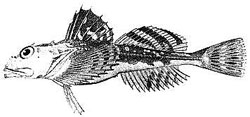
A sculpin is a type of fish that belongs to the superfamily Cottoidea in the order Perciformes. As of 2006, this superfamily contains 7 families, 94 genera, and 387 species.

The Scorpaeniformes are a diverse order of ray-finned fish, including the lionfishes and sculpins, but have also been called the Scleroparei. It is one of the five largest orders of bony fishes by number of species, with over 1,320.

The Cottidae are a family of fish in the superfamily Cottoidea, the sculpins. It is the largest sculpin family, with about 275 species in 70 genera. They are referred to simply as cottids to avoid confusion with sculpins of other families.
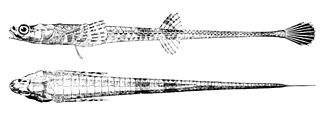
Agonidae is a family of small, bottom-dwelling, cold-water marine fish. Common names for members of this family include poachers, Irish lords, sea ravens, alligatorfishes, starsnouts, hooknoses, and rockheads. They are notable for having elongated bodies covered by scales modified into bony plates, and for using their large pectoral fins to move in short bursts. The family includes about 59 species in some 25 genera, some of which are quite widespread.
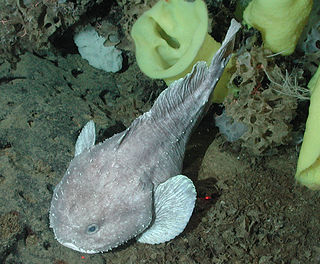
The fish family Psychrolutidae contains over 35 recognized species in 8 genera. This family consists of bottom-dwelling marine sculpins shaped like tadpoles, with large heads and bodies that taper back into small, flat tails. The skin is loosely attached and movable, and the layer underneath it is gelatinous. The eyes are placed high on the head, focused forward closer to the tip of the snout. Members of the family generally have large, leaf-like pectoral fins and lack scales, although some species are covered with soft spines. This is important to the species as the depths in which they live are highly pressurized and they are ambush/opportunistic/foraging predators that do not expend energy unless they are forced to.
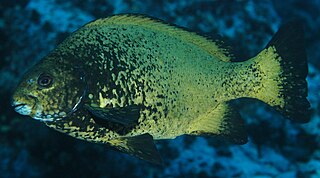
The sea chubs, also known as rudderfish and pilot fish and in Hawaiian as enenue or nenue, are a family, Kyphosidae, of fishes in the order Perciformes native to the Atlantic, Indian and Pacific Oceans usually close to shore in marine waters.

Cottus is a genus of the mainly freshwater ray-finned fishes belonging to the family Cottidae, the typical sculpins. They are often referred to as the "freshwater sculpins", as they are the principal genus of sculpins to be found in fresh water. They are native to the Palearctic and Nearctic.

Stichaeidae, the pricklebacks or shannies, are a family of marine ray-finned fishes in the suborder Zoarcoidei of the order Scorpaeniformes. Most species are found in the North Pacific Ocean with a few in the North Atlantic Ocean.
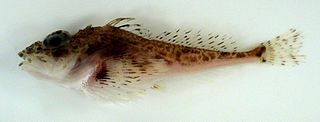
The scaled sculpins, Icelus, are a genus of marine ray-finned fishes belonging to the family Cottidae, the typical sculpins. Most of the fishes in this genus are found in the northern Pacific Ocean but they also occur in the North Atlantic Ocean.

Artediellus is a genus of marine ray-finned fishes belonging to the family Cottidae, the typical sculpins. Most of the fishes in this genus are found in the northern Pacific Ocean but they also occur in the Arctic and North Atlantic Oceans.

Enophrys is a genus of marine ray-finned fishes belonging to the family Cottidae, the typical sculpins. These fishes are found in the northern and eastern Pacific Ocean.
Stlengis is a genus of marine ray-finned fishes belonging to the family Cottidae, the typical sculpins. These fishes are found in the northwestern Pacific Ocean where they are only known from the waters around Japan.

Cottoidei is a suborder of ray-finned fishes which, according to the 5th edition of Fishes of the World, is placed within the order Scorpaeniformes, alongside the scorpionfishes, flatheads, eelpouts, sticklebacks and related fishes.

Scorpaeninae is a subfamily of ray-finned fish belonging to the family Scorpaenidae in the order Scorpaeniformes, it includes the scorpionfishes, the lionfishes and turkeyfishes. They bear venomous spines in the anal, dorsal and pelvic fins which can cause severe pain in envenomated humans. The subfamily is distributed in the tropical and temperate seas around the world.

Apodichthyinae is a subfamily of marine ray-finned fish belonging to the family Pholidae, the gunnels. These fishes are found in the North Pacific Ocean.

Opisthocentrinae is a subfamily of marine ray-finned fishes, classified within the family Stichaeidae, the pricklebacks or shannies. These fishes are found in the North Pacific Ocean.
Xiphisterinae is a subfamily of marine ray-finned fishes, classified within the family Stichaeidae, the pricklebacks or shannies. These fishes are found in the North Pacific Ocean.
Gymnelinae is a subfamily of marine ray-finned fish belonging to the family Zoarcidae, the eelpouts. Most species are found in the North Pacific Ocean but one genus is cosmopolitan, and another is endemic to the Southern Ocean.
Lycodinae is a subfamily of marine ray-finned fish belonging to the family Zoarcidae, the eelpouts. These eelpouts are found are in all the world's oceans, with a number of species being found off southern South America.
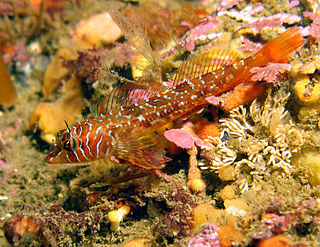
Jordaniidae is a small family of marine ray-finned fishes belonging to the order Perciformes. These fishes are found in the eastern North Pacific Ocean.















